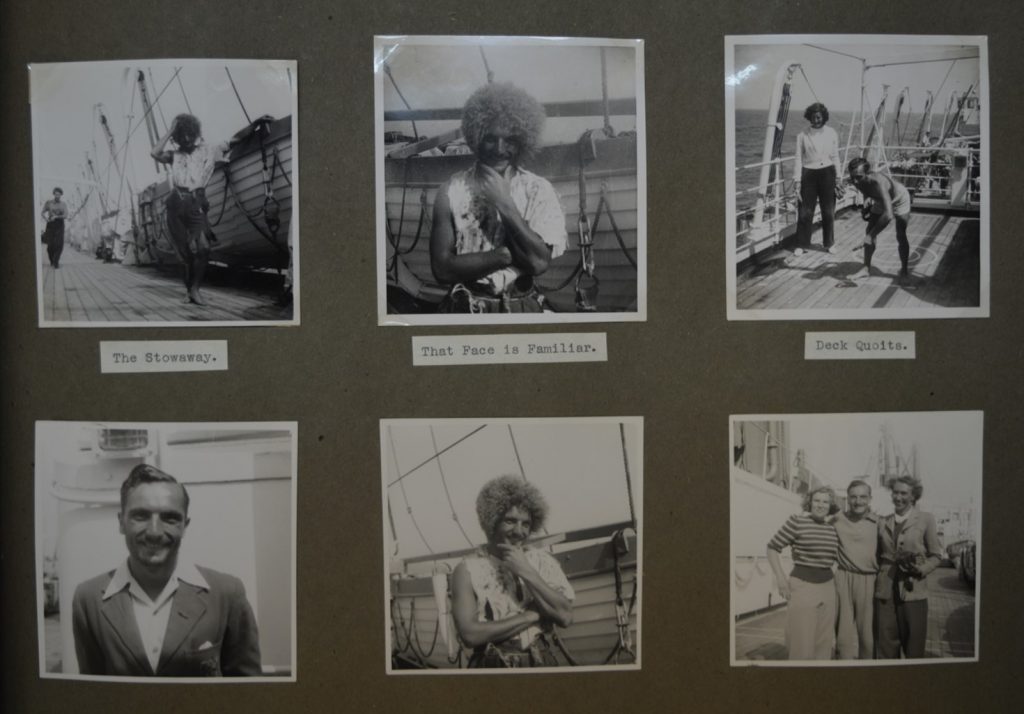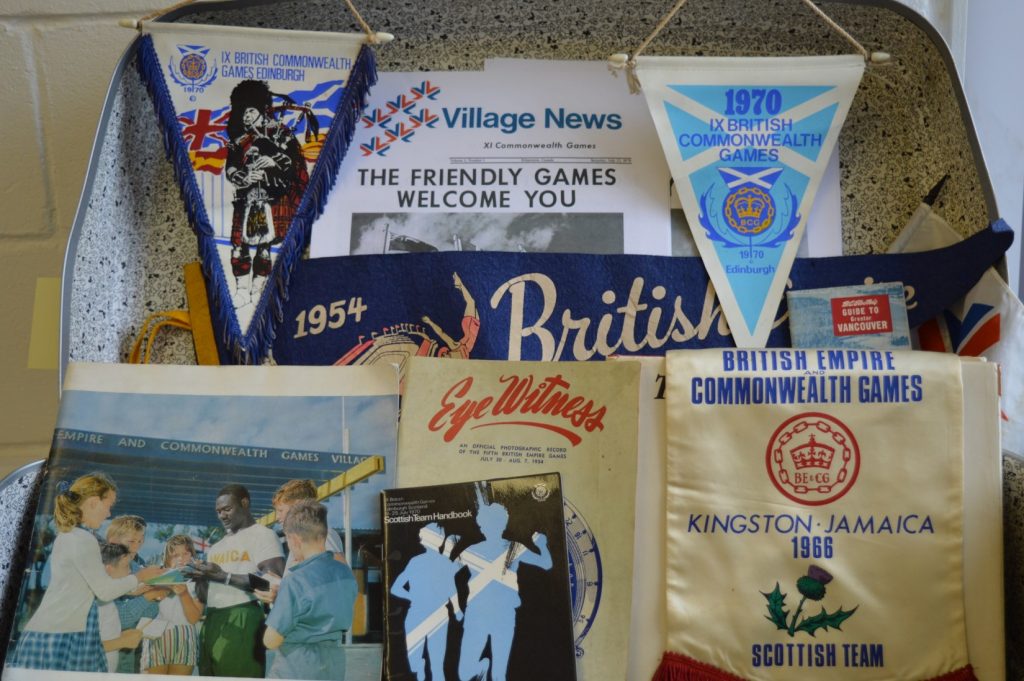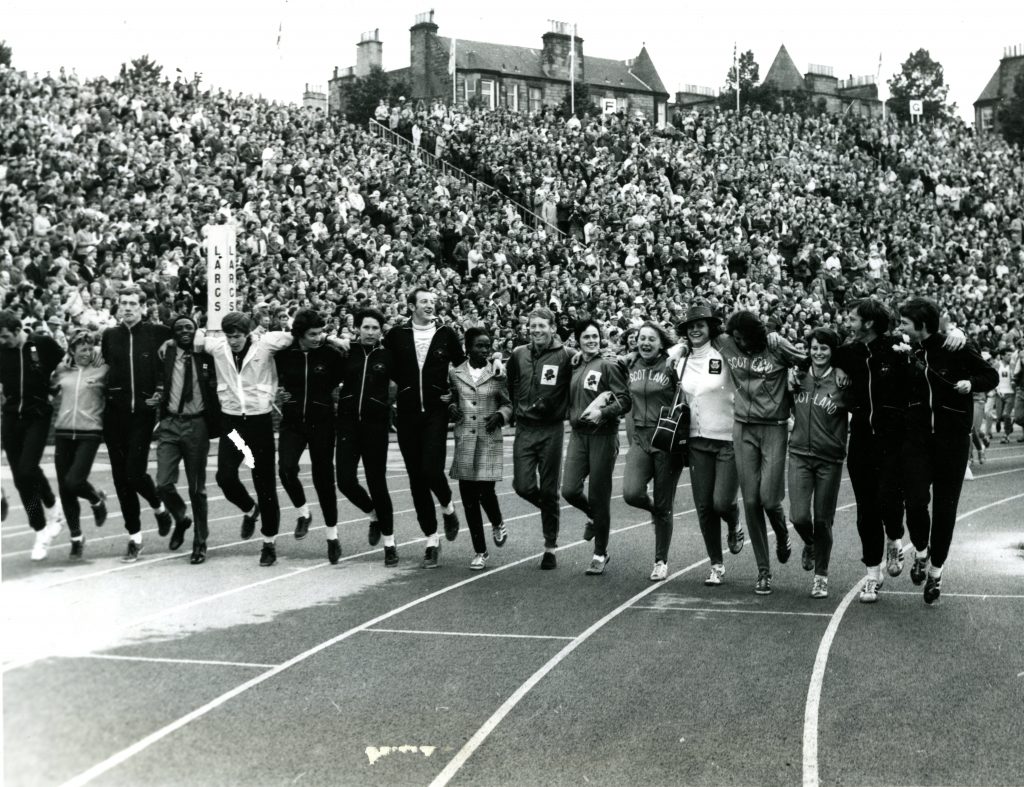My name is Curstaidh and I am a Master’s degree student pursuing an MSc in Archives and Record Management. Every now and then in an archive, you find an item that is so fascinating and transportive that before you know it, the motion-detector lights have gone off and your stomach is rumbling loudly in protest at its late lunchtime. Three weeks ago, I found such an item.
Despite the thick straggly strands of the mop that’s on top of his head, you can still see Peter Heatly’s broad smile beaming out at the camera. He is dressed up as a stowaway on board the Tamaroa, the ship which transported members of the Scottish and English Teams to Auckland for the 1950 British Empire Games. It’s no wonder that passengers had to dream up ways to amuse themselves – the ship left Southampton on the 16th of December 1949 and, apart from a quick stop on Curaçao off the coast of Venezuela, didn’t see land until arrival in Auckland on the 21st of January 1950.

The journey is documented in a photo album compiled by Peter Heatly, complete with captions, certificates and the ship’s farewell dinner menu. Who knows if the man in the photograph knew that he was sailing towards his first Gold Commonwealth medal, that he would go on to become one of Team Scotland’s most decorated athletes, that he would hold almost every managerial position available within the Commonwealth Games Framework all the way up to Chairman of the Commonwealth Games Federation? That indeed he would become Sir Peter Heatly? It is material such as this photograph album that encapsulates the value that personal papers add to an archive collection. We catch a glimpse of the person before the medals and titles and then we get to follow their lives through the items that passed by their own hands – personal letters, souvenirs, collectables and committee papers.
Heatly’s personal papers are one of three recent additions to the University of Stirling’s Commonwealth Games Scotland Archive. The bulk of this archive is made up of material deposited by the Commonwealth Games Scotland office, but the personal papers of Heatly, Willie Carmichael and Douglas Brown will allow researchers to gain a unique insight into the processes and politics of preparing for each of the Commonwealth Games.

For the last two months I have been building on the extensive work carried out by the University Library’s Exhibitions Assistant Ian on the collections of Sir Peter Heatly and Willie Carmichael. Together we have provided descriptions for all of the items and designed a system of arrangement to make it as easy as possible for users to navigate the two collections. It has been a source of great pride to discover, through Heatly and Carmichael, the important role that Scotland has played in the Commonwealth Games. Not only is Scotland one of just five countries that have participated in each Games since the first in 1930, but she has also hosted them 3 times (Edinburgh 1970, 1986 and Glasgow 2014) and was the host of the very first Commonwealth Youth Games (Edinburgh 2000). Although Carmichael and Heatly’s collections span a large timeframe, their combined material serves as a particularly rich resource for the 1970 and 1986 Games. Both were heavily involved in the organising of Edinburgh 1970, with Carmichael serving as the Director of Organisation, and Heatly served as the Chairman of Edinburgh 1986, before overseeing the organisation from afar in his role as Chairman of the Commonwealth Games Federation 1982-1990. Those who remember the successes of 1970 and the controversies of 1986 will no doubt be curious to get an insider’s perspective on the build-up and aftermath of each Games.
With Scotland not long home from Gold Coast 2018, their most successful away Games ever, it is the perfect time to come and have a look at the rich history that the Commonwealth Games Scotland Archive has to offer.
Curstaidh Reid is currently completing MSc in Archives and Record Management at the University of Glasgow. In June and July 2018 she worked on a project at the University of Stirling Archives to catalogue the personal papers of Sir Peter Heatly and Willie Carmichael.
